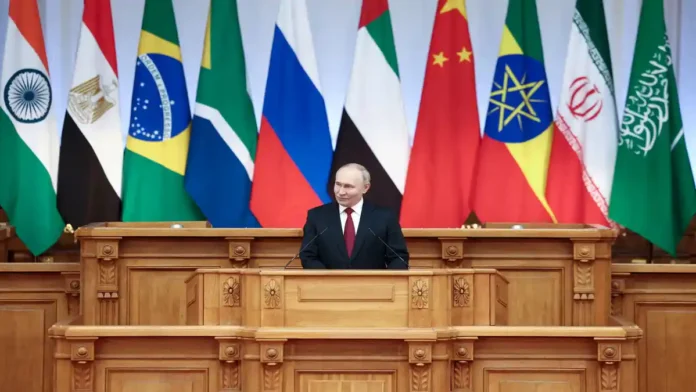Russian President Vladimir Putin is hosting the highly anticipated BRICS summit in Kazan, Russia, in October 2024. The summit brings together leaders from Brazil, Russia, India, China, and South Africa to discuss key geopolitical, economic, and security issues. Despite ongoing global tensions, notably Russia’s war with Ukraine, the BRICS summit signifies Russia’s determination to maintain its influence on the global stage.
BRICS Summit: A Defining Event Amid Global Tensions
The 2024 BRICS summit is significant due to its timing, as Russia faces international isolation stemming from its invasion of Ukraine. The presence of key leaders such as Chinese President Xi Jinping, Indian Prime Minister Narendra Modi, Brazilian President Luiz Inácio Lula da Silva, and South African President Cyril Ramaphosa underlines BRICS’ collective stance as a counterbalance to Western economic and political dominance.
Putin’s objective during the summit is clear: he wants to strengthen multilateral cooperation within BRICS and challenge attempts by Western powers to marginalize Russia on the international stage.
Key Topics of the Summit
1. Economic Collaboration and Currency Reform
One of the main topics on the agenda is the push to reduce dependence on the U.S. dollar by promoting the use of local currencies in international trade. Russia and China have been leading efforts to establish alternative financial systems to the dollar, and the BRICS members are expected to intensify these discussions during the summit.
India has also expressed interest in diversifying its trade currencies to reduce reliance on the dollar, aligning itself with Russia and China’s objectives. Brazil and South Africa, though more cautious, are open to exploring alternative monetary systems, particularly in intra-BRICS trade.
2. Geopolitical Realignment
The ongoing war in Ukraine remains a sensitive issue at the summit. Russia seeks support from BRICS members to counter Western sanctions and foster diplomatic backing. While China has been Russia’s closest ally in this matter, other members, especially India and South Africa, have called for diplomatic solutions while maintaining a non-aligned stance. Ukraine’s condemnation of U.N. Secretary-General António Guterres’ invitation to the BRICS summit highlights the international divide over Russia’s role in the war.
3. BRICS Expansion
There have been discussions regarding BRICS expansion, with countries such as Argentina, Saudi Arabia, and others expressing interest in joining the bloc. Putin has advocated for this expansion as a way to reshape the global order and promote the interests of developing nations.
Country Stances on Key Issues
1. Russia
As the host, Russia’s focus is on bolstering BRICS’ influence to counter Western isolation. Putin is keen on increasing cooperation in defense, cybersecurity, and energy while promoting the use of the ruble in international trade.
2. China
China’s position at the summit aligns closely with Russia’s on several key issues. President Xi Jinping has emphasized the need to de-dollarize the global economy and increase trade among BRICS members using local currencies. China also aims to use the BRICS platform to strengthen its leadership in global governance reform.
3. India
India’s Prime Minister Modi has highlighted economic collaboration within BRICS but has taken a cautious approach to align fully with Russia or China geopolitically. India continues to balance its relationships with the West, particularly the U.S., while fostering trade ties with BRICS countries.
4. Brazil
Brazil’s President Lula has shown a keen interest in strengthening BRICS’ role in reforming international institutions such as the IMF and the World Bank, advocating for greater representation of the Global South in global financial decision-making.
5. South Africa
President Cyril Ramaphosa has emphasized the need for inclusive economic growth and tackling inequality. South Africa is keen on using BRICS as a platform to address challenges such as climate change, development funding, and poverty reduction.
Leaders Participating in the Summit
- Vladimir Putin (Russia): As the host, Putin’s focus is on ensuring Russia’s continued relevance in the face of global sanctions and strengthening ties with BRICS allies.
- Xi Jinping (China): Aiming to bolster China’s global economic and political influence, Xi supports alternative currency systems and cooperation on global security challenges.
- Narendra Modi (India): India seeks to leverage BRICS for economic development while maintaining diplomatic neutrality in geopolitical matters.
- Luiz Inácio Lula da Silva (Brazil): Lula is pushing for greater Global South representation in international institutions and sustainable development policies.
- Cyril Ramaphosa (South Africa): Ramaphosa focuses on inclusive economic growth and addressing inequality through BRICS initiatives.
Conclusion: BRICS as a Counterbalance to Western Influence
The 2024 BRICS summit hosted by Putin is a strategic platform for Russia and its allies to push back against Western dominance. With discussions ranging from economic collaboration and de-dollarization to geopolitical realignments, the summit demonstrates BRICS’ role as a potential counterweight to Western-led global governance. Despite challenges, the BRICS nations continue to seek unity in shaping a new multipolar world order.



